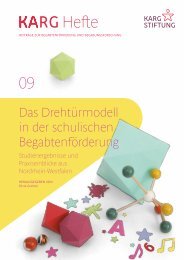FAQS: Frequently asked questions about giftedness
The Karg Foundation receives a lot of questions on the subject of giftedness—FAQs (Frequently Asked Questions)—far more often indeed than it did ten years ago. And this is a good thing! Many people involved in the educational processes of children have come to realize that giftedness can also be a fundamental personality trait of children and adolescents. The Karg Foundation wants to answer the questions you may have not only as educational and psychological professionals in educational institutions or working as educational providers, policy makers, or in training and further education institutes, but as parents and gifted people also: What is giftedness? How can it be identified? Who can provide advise for gifted children and their families? How can they be supported in the best possible way?
The Karg Foundation receives a lot of questions on the subject of giftedness—FAQs (Frequently Asked Questions)—far more often indeed than it did ten years ago. And this is a good thing! Many people involved in the educational processes of children have come to realize that giftedness can also be a fundamental personality trait of children and adolescents.
The Karg Foundation wants to answer the questions you may have not only as educational and psychological professionals in educational institutions or working as educational providers, policy makers, or in training and further education institutes, but as parents and gifted people also: What is giftedness? How can it be identified? Who can provide advise for gifted children and their families? How can they be supported in the best possible way?
You also want an ePaper? Increase the reach of your titles
YUMPU automatically turns print PDFs into web optimized ePapers that Google loves.
Are gifted children “different”?<br />
Gifted children tend to have superior abilities, and<br />
they are more receptive to new experiences and ideas,<br />
more interested in intellectually challenging leisure time<br />
activities, tend to rate their own capabilities at higher<br />
levels, and often show a greater willingness and desire to<br />
excel than children who are not gifted. But are there any<br />
other differences? According to research, gifted and nongifted<br />
children are more alike than different in areas<br />
outside of achievement-related domains. There are no<br />
differences between the two groups, for example, in the<br />
frequency of mental health problems or in their emotional<br />
well-being. Likewise, gifted people do not tend to be more<br />
conscientious or introverted, nor are they less agreeable.<br />
These children have comparable to higher social skills and<br />
just as many friends as children who are not gifted. Minor<br />
differences are found when evaluating one’s own appearance<br />
and athletic abilities: In these areas, the self-evaluations<br />
of gifted people tend to be slightly lower than those<br />
of their nongifted peers. These findings all relate to comparisons<br />
of gifted and nongifted individuals as groups, that<br />
is, to an average value that does not always apply universally<br />
to each individual. However, in certain cases, special<br />
circumstances may arise (see, e.g., the discussions on<br />
underachievement on p. 58 and extreme <strong>giftedness</strong> on p. 9).<br />
Problems can arise when the child’s needs are overlooked<br />
or when the environment responds to the needs inappropriately.<br />
The feeling of being “different from the others”<br />
may be present as well. However, this applies equally to<br />
both gifted and nongifted individuals.<br />
22 23
















